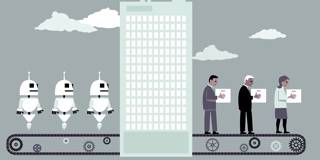Most of the reading public will have encountered scholarly predictions about the "future of work," and yet the most important elements of the debate lie in the past. As three recent books by leading economists show, understanding the history of technological change is crucial for anticipating what it will mean for employment in the decades ahead.
- Richard Baldwin, The Globotics Upheaval: Globalization, Robotics, and the Future of Work, Oxford University Press, 2019.
David G. Blanchflower, Not Working: Where Have All The Good Jobs Gone?, Princeton University Press, 2019.
Carl Benedikt Frey, The Technology Trap: Capital, Labor, and Power in the Age of Automation, Princeton University Press, 2019.
OXFORD – Work! It consumes much of our lives and energy. But how we work and what we get from it have changed dramatically over time, and, as all three books under review here show, further radical shifts are on the horizon. As is to be expected of books about the future of work in the twenty-first century, there are common themes – automation, globalization, inequality. But each also brings something original to the table.

David G. Blanchflower, Not Working: Where Have All The Good Jobs Gone?, Princeton University Press, 2019.
Carl Benedikt Frey, The Technology Trap: Capital, Labor, and Power in the Age of Automation, Princeton University Press, 2019.
OXFORD – Work! It consumes much of our lives and energy. But how we work and what we get from it have changed dramatically over time, and, as all three books under review here show, further radical shifts are on the horizon. As is to be expected of books about the future of work in the twenty-first century, there are common themes – automation, globalization, inequality. But each also brings something original to the table.